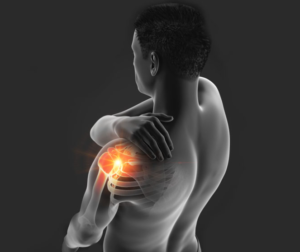Frozen Shoulder
The tissue around the joint stiffens leading to scar tissue generation and movements become difficult and painful. It comes and slowly goes away within a time period of almost one year. The incidence of pain is not age specific, the younger generation is more prone to suffer from such pain. In a few, it is momentary and lasts only a few months. Frozen shoulder is related to Apabahuka in Ayurveda which usually affects the shoulder joint because of vitiation of Vata dosha. According to Ayurveda, wasting of the shoulder is considered as the preliminary stage of the disease and the stiffness which occurs is the contribution of Kapha dosha. In many patients, because of the involvement of Kapha dosha cold exposure is felt at night time and the stiffness worsens.

Causes
The bones, ligaments, and tendons are covered in a capsule of connective tissue in the shoulder joint. When this capsule thickens and tightens it leads to a restricted movement called a frozen shoulder. This thickening and tightening can be because of the effect of injury, overuse of the joints in the case of drivers and weight lifters, and degenerative disorders like rheumatoid arthritis, cervical spondylosis, or neck disc displacement. This thickening and tightening lead to scar tissue around the joints causing restricted movement and pain on movement. Injury to vital parts, excess exposure to wind, A.C., sleeping in the wrong posture, vata aggravating diet and activities and excess consumption of pungent, bitter, and astringent foods can also cause frozen shoulder.
Stages Of Frozen Shoulders
Frozen shoulders usually last in 3 stages which can last for a few months. Freezing stage: In this stage, shoulder movements cause pain, and the ability to move the shoulder reduces Frozen stage: in this stage, pain may decrease but stiffness increases Thawing stage. In this stage, the range of movement begins to improve.
Ayurvedic Treatment For Frozen Shoulder
Frozen Shoulder Treatment in KPHB Hyderabad
Ayurvedic treatment for frozen shoulder aims to address the underlying imbalances in the body’s doshas (bioenergetic forces) and promote overall well-being. Frozen shoulder, also known as adhesive capsulitis, is a condition characterized by stiffness, pain, and limited range of motion in the shoulder joint. Ayurveda, the traditional system of medicine in India, employs a holistic approach to healing that involves lifestyle modifications, herbal remedies, and therapeutic practices. Here’s a description of Ayurvedic treatment for frozen shoulder:
Vaidya Wellness Centre follows the following treatments to relieve pain and stiffness of joints and rejuvenate the degenerated connective tissue like oil massage, oleation, Pizhichil (streaming of hot oil), herbal leaf poultice, rice poultice, herbal powder poultice and cotton swabs soaked in hot medicated oil applied to the affected joint. Herbal Nasal drops and Medicated enema along with some oral medications are also found effective. Though a frozen shoulder is not a life-threatening illness, it causes difficulty to do daily work as the hand and shoulder is involved in almost all the work. So attention, regular treatment, and exercises play a significant role in management.
It’s important to note that Ayurvedic treatment is individualized, and the specific recommendations may vary based on an individual’s constitution and the underlying causes of the frozen shoulder. Consulting with a qualified Ayurvedic practitioner is crucial for personalized and effective treatment. Additionally, individuals with frozen shoulder should seek guidance from their healthcare provider for a comprehensive approach to managing the condition.